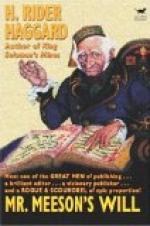“I was repeating, my Lord,” said the harsh voice of Mr. Meeson, “that the principle of an hereditary peerage is the grandest principle our country has yet developed. It gives us something to look forward to. In one generation we make the money; in the next we take the title which the money buys. Look at your Lordship. Your Lordship is now in a proud position; but, as I have understood, your Lordship’s father was a trader like me.”
“Hum!—well, not exactly, Mr. Meeson,” broke in Lord Holmhurst. “Dear me, I wonder who that exceedingly nice-looking girl Lady Holmhurst is talking to can be!”
“Now, your Lordship, to put a case,” went on the remorseless Meeson, who, like most people of his stamp, had an almost superstitious veneration for the aristocracy, “I have made a great deal of money, as I do not mind telling your Lordship; what is there to prevent my successor—supposing I have a successor—from taking advantage of that money, and rising on it to a similar position to that so worthily occupied by your Lordship?”
“Exactly, Mr. Meeson. A most excellent idea for your successor. Excuse me, but I see Lady Holmhurst beckoning to me.” And he fled precipitately, still followed by Mr. Meeson.
“John, my dear!” said Lady Holmhurst, “I want to introduce you to Miss Smithers—the Miss Smithers whom we have all been talking about, and whose book you have been reading. Miss Smithers, my husband!”
Lord Holmhurst, who, when he was not deep in the affairs of State, had a considerable eye for a pretty girl—and what man worthy of the name has not?—bowed most politely, and was proceeding to tell Augusta, in very charming language, how delighted he was to make her acquaintance, when Mr. Meeson arrived on the scene and perceived Augusta for the first time. Quite taken aback at finding her, apparently, upon the very best of terms with people of such quality, he hesitated to consider what course to adopt; whereon Lady Holmhurst in a somewhat formal way, for she was not very fond of Mr. Meeson, mistaking his hesitation, went on to introduce him. Thereupon, all in a moment, as we do sometimes take such resolutions, Augusta came to a determination. She would have nothing more to do with Mr. Meeson—she would repudiate him then and there, come what would of it.
So, as he advanced upon her with outstretched hand, she drew herself up, and in a cold and determined voice said, “I already know Mr. Meeson, Lady Holmhurst; and I do not wish to have anything more to do with him. Mr. Meeson has not behaved well to me.”
“’Pon my word,” murmured Lord Holmhurst to himself, “I don’t wonder she has had enough of him. Sensible young woman, that!”
Lady Holmhurst looked a little astonished and a little amused. Suddenly, however, a light broke upon her.
“Oh! I see,” she said. “I suppose that Mr. Meeson published ’Jemima’s Vow.’ Of course that accounts for it. Why, I declare there is the dinner bell! Come along, Miss Smithers, or we shall lose the place the captain has promised us.” And, accordingly, they went, leaving Mr. Meeson, who had not yet realized the unprecedented nature of the position, positively gasping on the deck. And on board the Kangaroo there were no clerks and editors on whom he could wreck his wrath!




